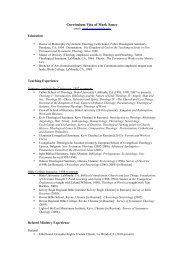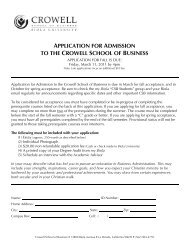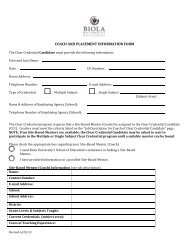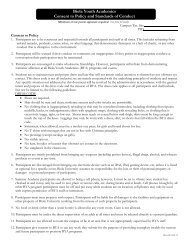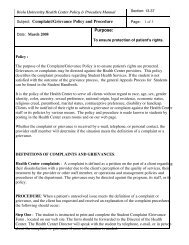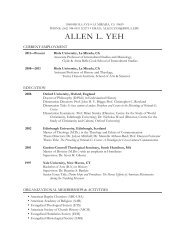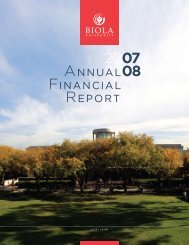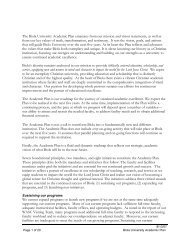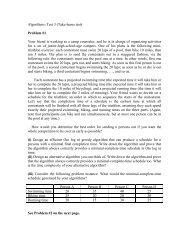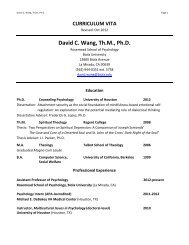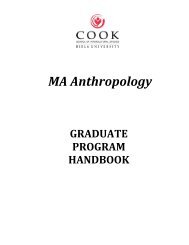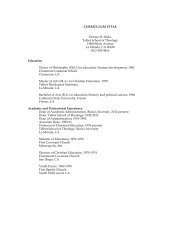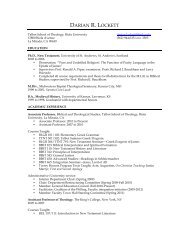Create successful ePaper yourself
Turn your PDF publications into a flip-book with our unique Google optimized e-Paper software.
note: All Biological Science majors automatically meet the general<br />
education requirement of eight units of science and<br />
mathematics. The foreign language requirement is met by<br />
two years in high school or first four units in college.<br />
Minor<br />
A Biological Sciences Minor is offered with the completion of 20<br />
units, 12 of which must be upper division. General Biology (111 and<br />
112) are required. The remaining elective units are to be approved by<br />
a department adviser.<br />
Admission Requirements<br />
High school requirements are: one year of biology, one year of chemistry,<br />
three years of mathematics, and two years of foreign language.<br />
One year of physics is desirable. Deficiencies can be fulfilled with<br />
permission from the Department of Biological Science.<br />
English Requirements<br />
Students wishing to enroll in any courses in the Biological Sciences<br />
must be eligible to take English 100 or 110 A or must have the permission<br />
of the instructor to take the course.<br />
Courses (BIOS)<br />
bIos 100 Biological Principles: Lecture ..............................................3<br />
Unifying principles of biology with emphasis on human organ<br />
systems. No lab is required, but Biology 110 is the lab course<br />
designed to accompany this course. Biology 100 without the<br />
lab (110) will not receive transfer credit at most other universi-<br />
ties. Not open to biology majors.<br />
bIos 110 observational Biology — Laboratory ..............................2<br />
Observational and investigative approach to surveying a<br />
range of biological organisms and examining selected hu-<br />
man systems. Three hours lab, one hour lecture / discussion<br />
designed to be taken with Biology 100. Lab fee: $40.<br />
bIos 111 General Biology i .....................................................................3<br />
Introductory course for majors emphasizing the principles of<br />
cellular and molecular biology, genetics, development.<br />
bIos 111 l General Biology i : Laboratory ............................................1<br />
This laboratory accompanies General Biology I and is divided<br />
between observational and experimental approaches, with<br />
emphasis on the collection and interpretation of quantitative<br />
data. Frequent lab discussion of relevant issues and literature<br />
will be included. Usually taken concurrently with Biology 111,<br />
but may be taken separately if Biology AP credit has been<br />
granted. Lab fee: $60<br />
bIos 112 General Biology ii ....................................................................3<br />
Continuation of general biology emphasizing the principles<br />
of human physiology, ecology and homeostatic mecha-<br />
nisms. Prerequisite BIOS 111 or signature of instructor. Spring<br />
semester.<br />
bIos 112 l General Biology ii: Laboratory ............................................1<br />
This laboratory, which accompanies General Biology II, will<br />
involve dissection as well as experimentation. A major project<br />
involving the <strong>Biola</strong> Creek is included. Usually taken concur-<br />
rently with Biology 11, but may be taken separately if Biology<br />
AP credit has been granted. Lab fee: $60.<br />
bIos 120 Current Topics in Biology......................................................3<br />
Selected topics of current interest and concern are studied.<br />
Sections are offered each year upon sufficient demand. Topics<br />
are the following:<br />
Human Ecology. An introduction to contemporary environ-<br />
mental problems emphasizing man’s role in their cause and<br />
responsible stewardship of natural resources, including such<br />
topics as biological diversity, cycles in nature, population dy-<br />
namics, pollution, progress, energy sources, natural resources,<br />
endangered species, and attitudes toward the earth.<br />
Human Biology. Selected body systems and/or diseases will<br />
be studied in detail.<br />
Nutrition. A detailed study of the basic nutritional needs<br />
of humans: water, carbohydrates, lipids, proteins, vitamins<br />
and minerals. Also included is coverage of certain nutritional<br />
issues such as health foods, megavitamins, obesity and food<br />
additives, as well as a computer-aided personal diet-analysis<br />
assignment.<br />
Plant / Animal Studies. An investigative and/or identification<br />
approach to studying selected plant and/or animal groups.<br />
Baja Trip fee: $900 (if field taught in Baja). (See also Biology<br />
20<strong>05</strong> – 20<strong>07</strong> C ATA LO G Undergraduate Programs 71<br />
333).<br />
bIos 130 seminar in Biological science ..........................................1-2<br />
Directed research (literature or laboratory) in selected areas of<br />
biology with written and/or oral presentations by students;<br />
intended to stimulate inquiry and creative thought. Not open<br />
to biology majors.<br />
bIos 222 Botany .........................................................................................4<br />
The study of the organs, tissues, functions and responses to<br />
environment of typical flowering plants and the morphol-<br />
ogy and life history of the major lower plant groups. Some<br />
classification of local forms is included, and limited use of the<br />
scanning electron microscope is available. Three hours lecture,<br />
four hours laboratory. Prerequisite: 100 or 111. Lab fee: $60.<br />
bIos 252 human anatomy .....................................................................3<br />
An introduction to the basic structure and function of the hu-<br />
man body. Laboratory emphasis varies from section to section<br />
to meet the needs of the different majors. Cadavers are used.<br />
Two hours lectures, one hour pre-lab, three hours laboratory.<br />
Lab fee: $60.



